Top 10 features to look for in an HMS
The Hospital Management Software’s primary goal is to make the processes within a hospital simpler. It aims at saving time and resources for the end-user i.e, hospital admin staff. With the plethora of options available, it is difficult to understand what to look for in Hospital Management Software.
In this blog, we will be discussing the top 10 features to look for in Hospital Management Software.
-
IP and OP Patient Management:
One of the first and most important features of an HMS is In-patient and Out-patient Management. A good HMS should allow you to record patient details to be stored in the database. It allows you to record Multiple visits and details related to the visit like prescriptions, clinical notes, treatment plans, etc.
This data should be made accessible at any point in time to the doctor in charge and to other doctors in case of multiple doctors working with the same patient. The doctors should also be able to share this information with doctors from different facilities.
There should be an option to switch a patient from OP to IP if required. The software should also help in the allocation of beds using availability, scheduling, etc.
-
OT Management:
Operation theatre management plays a crucial role in various aspects such as reducing unnecessary patient traffic, pilferages, reducing queuing, etc.
The OT management module must primarily consist of scheduling operations according to time and availability. Additionally, the drugs that are required for a particular procedure have to be organized and monitored. Hospitals have encountered cases of pilferage and theft during operational procedures that result in huge losses. A good HMS must be able to keep track of the above-mentioned issues.
-
Appointment scheduling:
Appointment scheduling is one of the most important features in a hospital of any scale. This feature helps in improving the efficiency of the doctors and optimizing working hours.
It reduces the overcrowding of the hospital and the waiting time for the patients. This has a direct impact on customer satisfaction as well.
-
Billing and Insurance:
The billing module is one of the biggest time savers while using the HMS. A good HMS will provide the flexibility of generating bills upon the click of a button. The bills can also be customized based on the desired format for your hospital.
The Billing module must also have the ability to generate GST reports for easy auditing and provide discounts wherever required.
The billing module can contain predefined prices for different medicines, procedures, doctor fees, etc. A highly efficient HMS will also allow you to package some of these items under the name of one procedure.
Example: Covid-19 5-day package includes room charges, medication charges, doctor consulting fee, etc packaged and saved already on the database.
-
Pharmacy Integration:
The best practice to avoid any kind of loss or pilferages in a hospital pharmacy is to integrate the pharmacy module with the hospital management. A doctor should be able to view expiring drugs and intent drugs directly to the pharmacy without a hassle.
Some of the hospitals have been successful in converting the pharmacy to a dispensing unit only and performing billing and cash-related activities at a different touchpoint. This helps in having better control of pharmacy finances and other data which is otherwise only accessible to the pharmacy staff and can be easily tampered with.
-
Stock Management:
There are way more stocks that require effective management in a hospital, apart from the pharmacy. Some of the stocks are drugs required for OT procedures, masks, surgical kits, etc. This feature is important to track the usage of goods and ensure they are being used efficiently.
-
Laboratory Management:
Labs often operate as separate units in the hospital. Integrating lab data with the other departments makes the diagnosis process much faster.
Some of the important places that an HMS can play a vital role in the laboratory are:
- Adding test results to patient information that can be directly accessed by the consulting physician.
- Collecting and maintaining test samples accurately without the slightest chance of manual error.
- Reporting via mobile, WhatsApp, etc. directly to the patients anytime.
-
Discharge Summary:
All the information related to the patient’s procedure is recorded by different departments at different touch points. Due to this integrative process, generating the discharge summary takes no time. It can literally be done with the click of a button.
-
Distinct User roles:
Not every user of the software has the need to access every feature. A well-built HMS allows you to assign roles with defined functions. This ensures that not everybody can edit or tamper with important information such as finances, stock, etc.
Example: A user with admin rights has the ability to change stock quantity in the pharmacy. But, a user with manager access will only be able to record the inflow and outflow of stocks.
-
Analytics:
Analytics plays a very important role in defining the quality of software. Some of the different analytics reports to look for in an HMS are:
- A number of patients are segregated into unique and recurring visits to understand the patient volume.
- Department-wise collection to analyze the performance of each department individually.
- Doctor wise collection to help in calculating TDS.


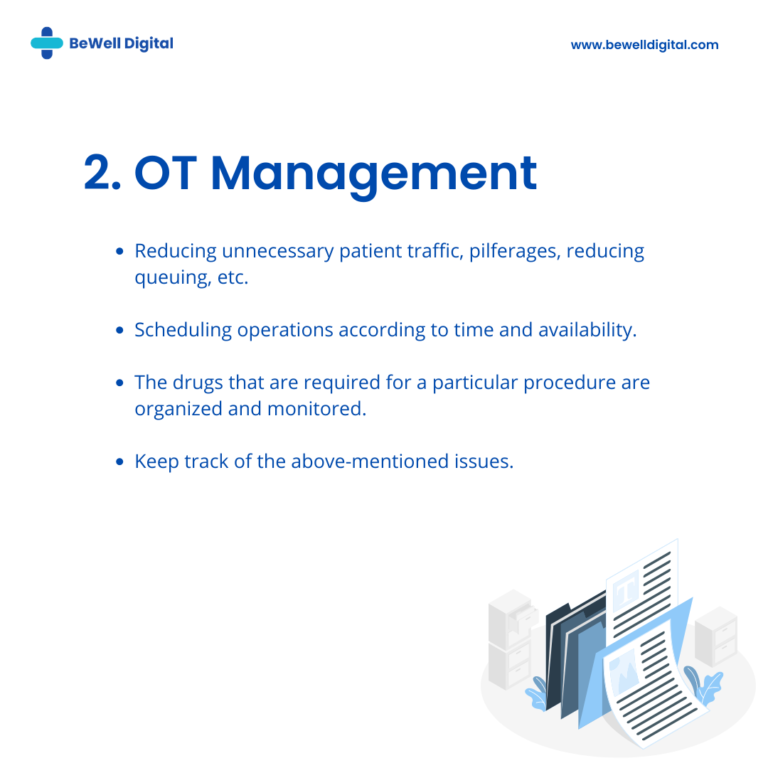
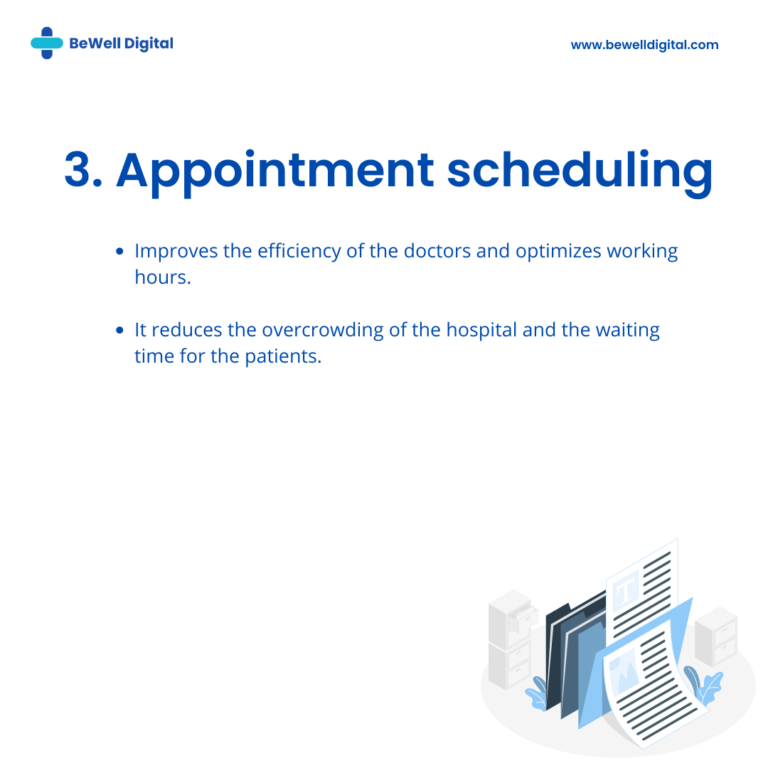
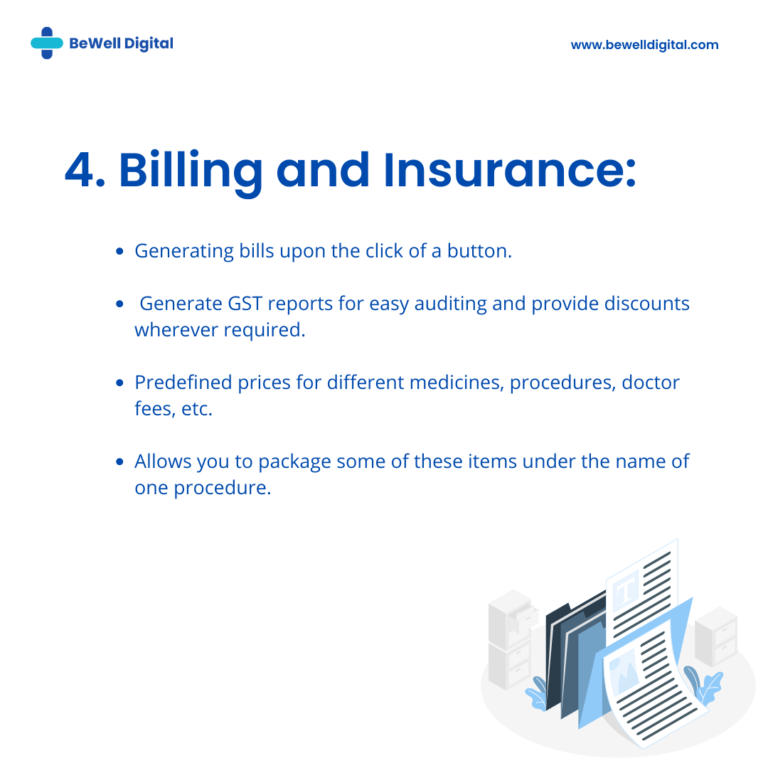
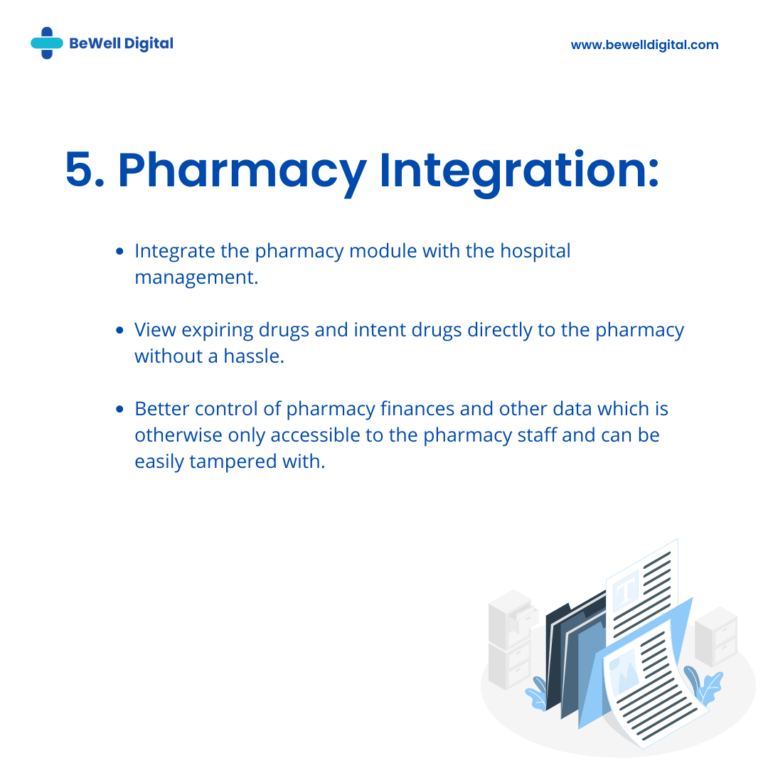
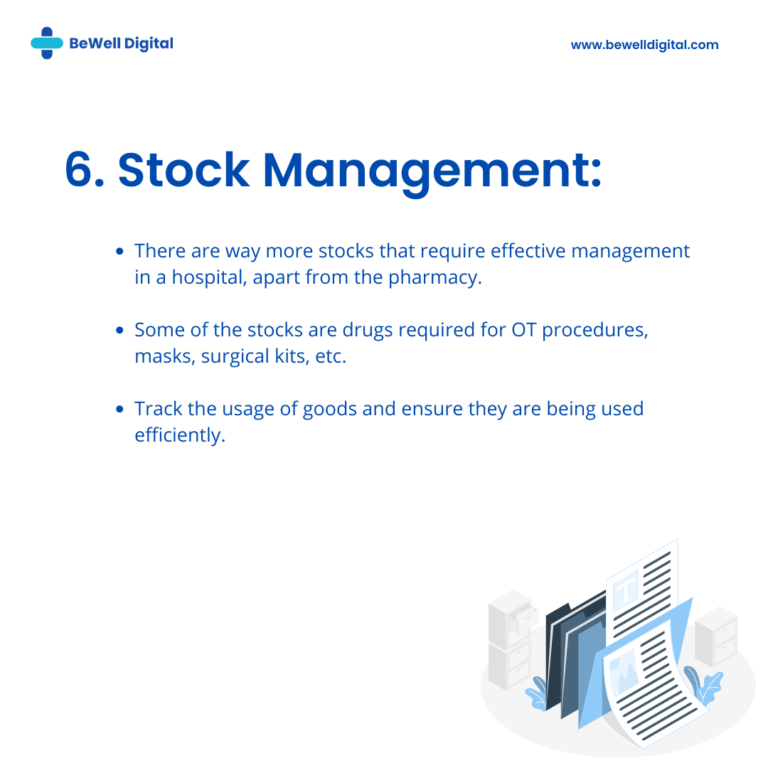
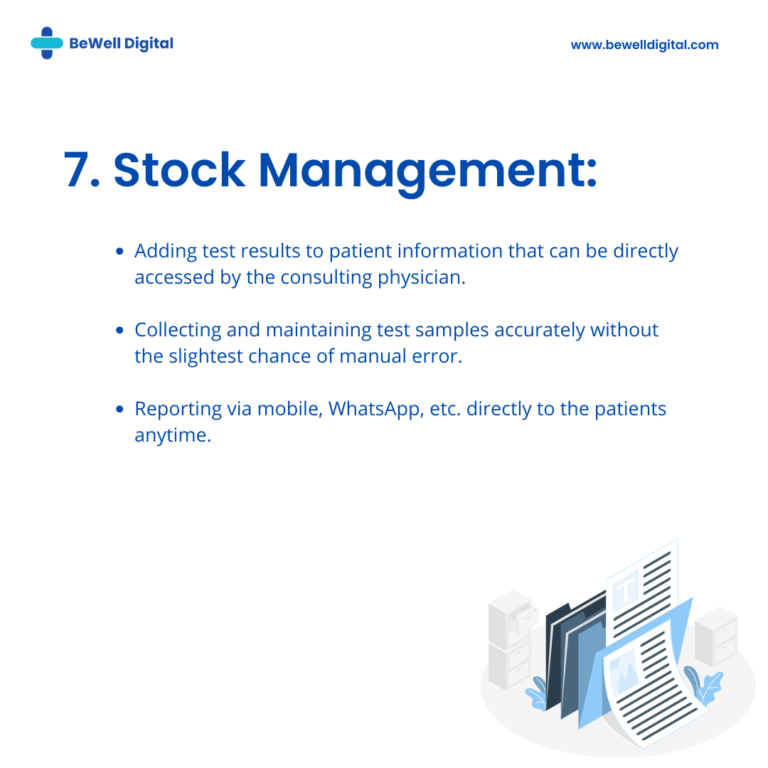
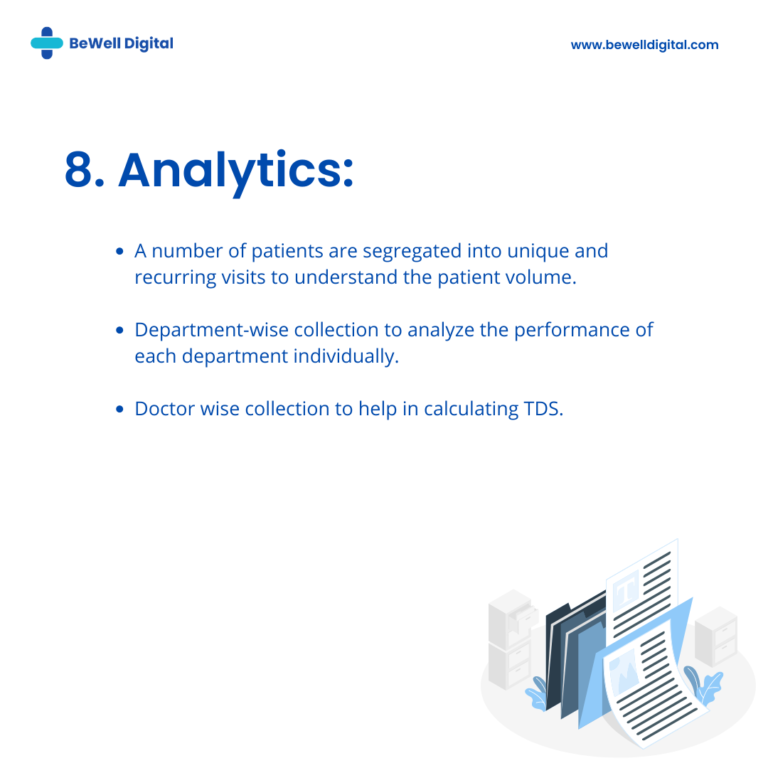
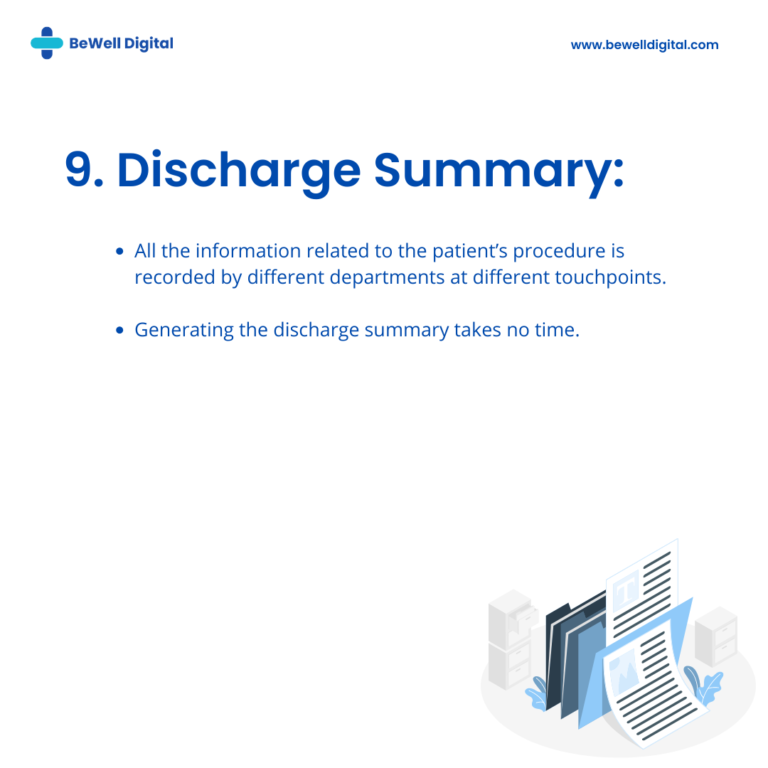
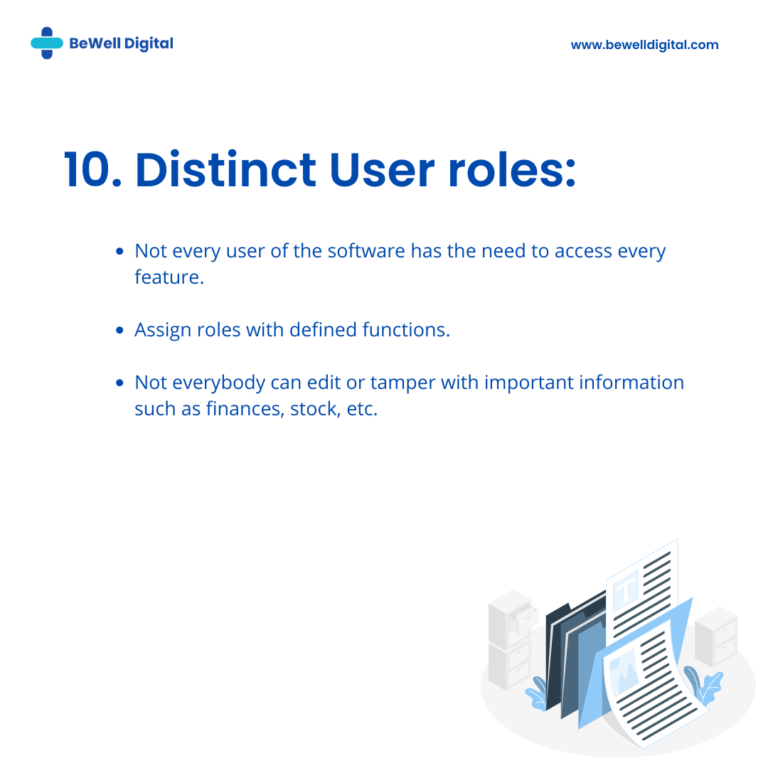
BeWell Digital’s HMS software:
BeWell’s HMS is designed to incorporate all of these important features and much more into the software. We aim at reducing the turnaround time and improving patient care. We provide a cloud-based HMS solution that saves your data on the cloud and can be retrieved anytime, anywhere.
Get in touch with us today to get a free trial version of our software. Write to us at support@bewelldigital.com to book a demo.
Follow us on
About Author

A marketing professional with a masters degree in Business Administration. Anvita has been associated with Health-tech research and content building since 2021. According to her, She has always been always been fascinated by the wholesome idea of using technology to improve healthcare delivery and how it has a direct impact on saving lives. Get in touch with her for a fun discussion on healthcare, marketing or anything related to visual art 😊
Contact
BeWell Digital Technologies Pvt.Ltd.,
Layout, Ashok Nagar, Bengaluru,
Karnataka 560025, India.
Follow Us
Copyright © 2022 BeWell Digital

